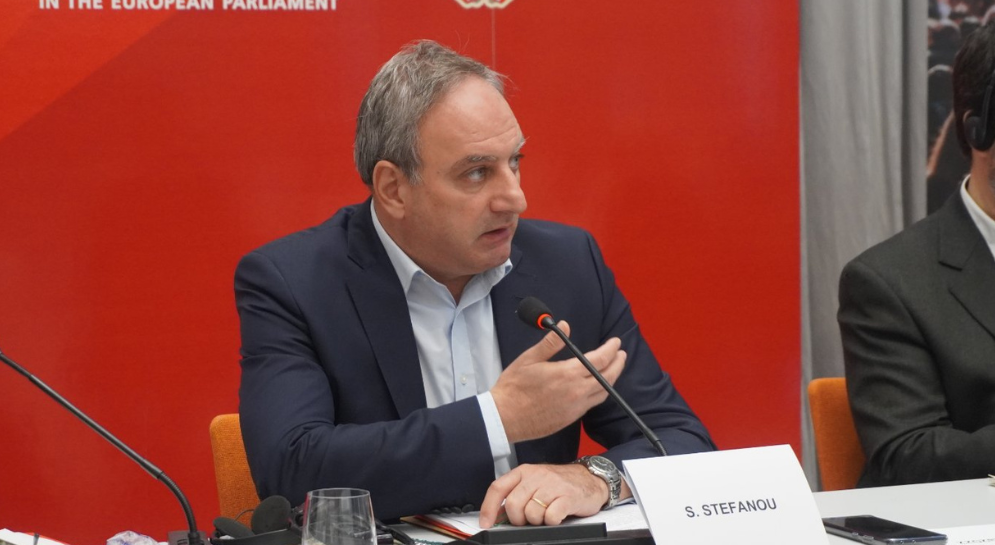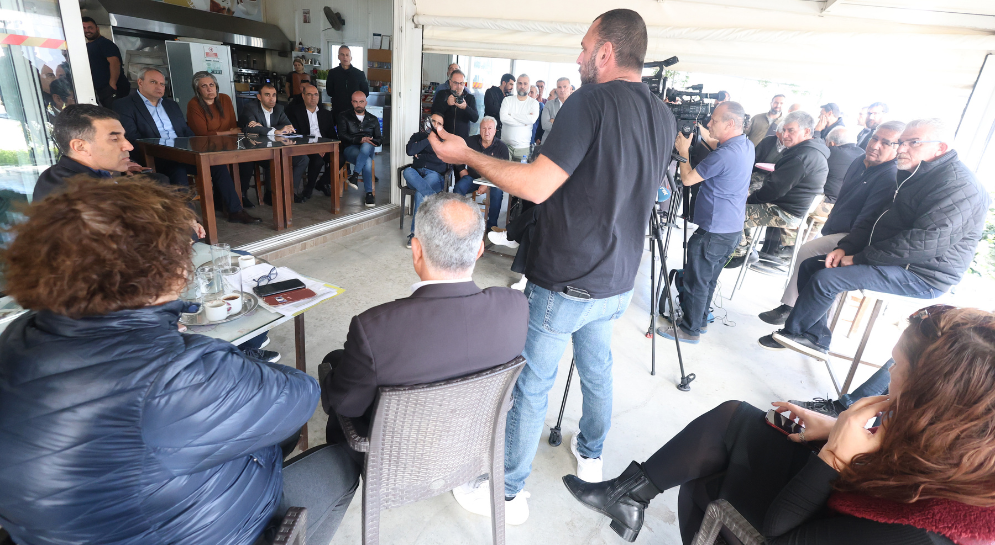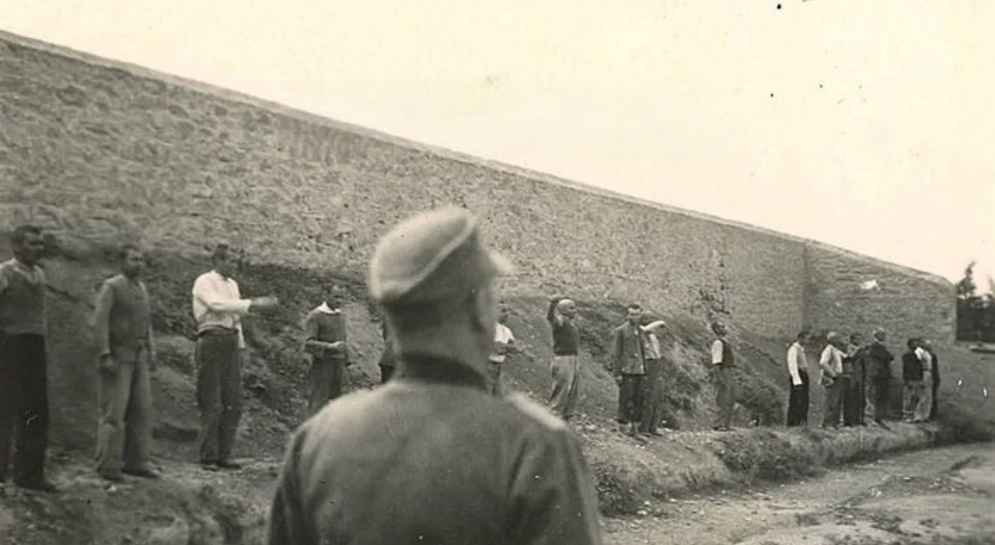
Speech by the General Secretary of the Central Committee of AKEL Stefanos Stefanou to the Bureau of the Left GUE/NGL Group in Cyprus
18 November 2022, Larnaca
It is a great pleasure for us that after quite some time we have the opportunity to host you again in Cyprus and to discuss in person how we can seek solutions together, how we can stand in solidarity with each other’s problems, with a view to achieving progress and prosperity for our peoples.
Today’s global environment is complex, harsh and regenerates all kinds of inequalities. The dominant policies are incapable of responding to the demands of our times, to address the challenges that will determine the future of all humanity. The environment, energy and food security, the question of access to quality free public health and education and development, have all been subordinated to serve geopolitical designs and the war over interests that is now raging at every level, in all corners of the globe.
In these conditions, the Left is faced with a historic task. Inheriting the legacies of our common struggles and with the future of humanity as our compass, we must put forward what unites us, find solutions together, assert what needs to be changed and project a new perspective to a world that has lost its orientation. Everything that has happened since our last meeting last November unfortunately confirms the accelerating destructive course of international relations, the growing undermining of international law and the discriminatory subordination of human rights to serve political choices made by the mighty of the world.
The war in Ukraine and the rapid deterioration in the living conditions of all the peoples across the EU without exception have been added to the suffering caused by the COVID-19 pandemic, the conflicts that were already afflicting the international community and, with particular intensity, the Eastern Mediterranean region. Insecurity, the virtual abandonment of diplomatic means for the settlement of international disputes, the promotion of military might and power – unfortunately by the EU as well in full alignment with NATO – and the consequences of a disastrous war on people’s access to essential goods now characterise our grim reality.
In these circumstances, the attempt to resolve the disputes that form the political landscape of the Eastern Mediterranean is difficult. Pre-existing conflicts have been rekindled and states such as Turkey and Israel are attempting to exploit the current circumstances seeking to consolidate their illegal assertions and strengthen their hegemonic role in the region.
In this environment, where international law is increasingly subject to the power of force and where the attention of the UN is naturally focused on conflicts that threaten world peace and security more immediately, it is obvious that bringing the Cyprus problem back on the agenda of the international community is a difficult task. And it is made more difficult by the fact that five years of a negotiating vacuum have already gone by, five years which Turkey and Turkish Cypriot leader Ersin Tatar have made use of to impose new partitionist fait accompli.
During this time, and given the additional obstacles created by the Turkish aggression, it has not been possible to bring the two communities closer together and obviously neither the resumption of a meaningful dialogue. With the initiative for action in such cases belonging primarily to the parties directly affected, it would be unreasonable to expect that the role of third parties is the most decisive factor that can give impetus to the peace process.
It is a truism that in politics, as in every aspect of our lives, problems are solved when those who suffer their consequences should take the lead in resolving them. All the more so in today’s difficult conditions for the whole of humanity, the effort to bring the Cyprus problem back to the centre of attention of the UN and the EU demands from us that initiatives must be undertaken first that convey a message of Cyprus’ perspective in all directions.
AKEL considers that the non-solution of the Cyprus problem is harmful to Cyprus and its people, Greek Cypriots and Turkish Cypriots, to Turkey and to the international community in general.
It is also damaging to the EU itself, which is called upon to handle the shocks and problems caused by the current status quo within a framework with numerous other burning problems and conflicts. And I am not only referring to the complications that are being caused in EU-Turkey relations, but also to Turkey’s instrumentalisation of the pending issues arising from the lack of a solution of the Cyprus problem, seeking to impose its hegemonic role in the wider region. Needless to say, this is not in line with good neighbourly relations being promoted by the EU and even more so with the status of a candidate for accession country.
From the issues of energy, the delimitation of maritime zones to the exploitation of the tragic need of refugees to relocate, from the violation of the Resolutions of the UN on Varosha to the establishment of new military bases in the occupied territories of Cyprus, these and other actions by Turkey are leading to an explosive mix of aggression, arrogance and attempts to impose the law of the mighty. This inevitably affects the security of citizens, stability and prosperity in the EU itself.
On the contrary, if anything can have a positive impact on developments, if anything can contribute to the creation of conditions ensuring normalisation, stability and less insecurity in the region, something that we all need – obviously with different degrees – it is the solution to the Cyprus problem itself.
However distant this goal may seem today, for the reasons I have outlined beforehand, we believe that it remains feasible and that under the right preconditions the Cyprus problem can be resolved soon and more easily than other challenges facing the international community. The Cypriot-owned procedure that took us just half a mile from a solution, in the UN Secretary General’s fond expression, in 2017, has bequeathed us a negotiating body of work that can easily lead to a comprehensive solution to the problem if political will is demonstrated.
Despite the different narratives of those who participated in the Conference, everyone without exception admits that at Crans Montana we came very close to a solution with regards the core aspects of the Cyprus problem.
For that reason, if we continue from where we had remained at Crans Montana, a speedy solution to the Cyprus problem is realistic. This has, after all, been the position of Mr. Guterres himself for four years, of the UN Security Council, as well as of the relevant resolutions of the European Parliament itself.
In AKEL’s view, which is also based on the accumulated experience of the international community in resolving major political problems, convergences reached after decades of painstaking negotiation must not be destroyed. The delicate balance that has been achieved on a number of core issues must be preserved. Firstly, because it represents a mutually acceptable conclusion of the two sides and secondly because if issues of such importance and sensitivity are reopened, we are bound to be led into further endless discussions.
Such a development does not serve either side involved on the Cyprus problem. It does not solve the prospect of achieving a solution. For example, the Turkish Cypriot leader Mr. Tatar is demanding acceptance of ‘sovereign equality’ for the Turkish Cypriot community as a precondition for the resumption of negotiations. In other words, he demands the recognition of separate sovereignty, which refers to a separate state and precisely for that reason it is impossible to accept. This issue was discussed for decades until we reached a mutually acceptable convergence between Christofias and Talat, which addressed the legitimate concerns of both communities without shadows of doubts being left about the existence of two separate entities in Cyprus.
The convergences recorded do not refer to sovereign, but to political equality, which was agreed and expressed, inter alia, through a series of convergences recorded for effective participation in the institutions and decisions of the central government.
A second example is the way of establishing federation. What Mr. Tatar is now demanding, and indeed put forth as a precondition, is that we accept the creation of the new state of affairs by two separate and sovereign entities. This is an unacceptable position.
As we all know, there are two ways of creating a federal state, the merger of separate states and the transformation of a unitary state into a federal state, which is the modern trend. This debate is not theoretical, but substantive. Precisely because in the case of a merger of separate states, serious issues arise, such as the continuity of their participation in international organisations, the continuity of international treaties, the exclusion of any future attempt at secession.
The Turkish Cypriot side insisted on the merger of separate states, the Greek Cypriot side insisted on the transformation of the constitutional structure of the Republic of Cyprus and we finally reached a mutually acceptable convergence. The way the federation will be created will not be explicitly stated, but will derive from the content of the solution. The decisive point is that there is a convergence recorded for a continuity in the participation in international organisations, a continuity in the international treaties and the exclusion of secession.
In the phase we are in today, against the background of the prolonged stalemate on the Cyprus problem, even the United Nations has stopped referring to the issue of continuing the negotiations from where they left off at Crans-Montana. The main reason for this negative development is the official backtracking of Turkey and Mr. Tatar in favour of a two-state solution. A position which they had effectively abandoned two decades ago.
However, the fact that instead of consistent support towards the position for the resumption of negotiations from the point where they were interrupted, so-called “new ideas” were also erroneously put forward by President Anastasiades, which clash with the position of the UN Secretary General given that they reopen basic convergences, is not irrelevant. This gave the Turkish side the alibi to backtrack and created vital room for the submission of “new ideas” by third parties. Many of these “ideas”, in an effort to bridge the gap by pursuing the simplistic logic of equal distances, result in proposals that destroy the body of work of the talks, and approach Turkish demands and cannot be accepted.
To convince Turkey to get back on the tracks of Crans-Montana, we must reaffirm our commitment to the convergences agreed and seek to ensure that the Guterres Framework becomes a strategic understanding without asterisks and footnotes. We must make use of the informal document on the implementation mechanism for the solution, which focused on the termination of the Treaty of Guarantee and all unilateral intervention rights and the speedy withdrawal of the occupying troops.
But to achieve this objective, we must also put forth some well-intentioned incentives that should never cross our “red lines”, both to the Turkish Cypriots and Turkey, to be implemented after the solution of the Cyprus problem, as envisaged in a very specific way in the proposal that AKEL had submitted two years ago. A proposal that has become even more relevant today with the unprecedented energy crisis as a result of the war in Ukraine, given that it includes the use of the energy and natural gas factor as an incentive for a solution.
As we head towards the presidential elections in Cyprus and with the forthcoming elections in Turkey due next June on the horizon, we do not expect that in the coming months we can look forward to any substantive developments. The question is what happens next. Can Turkey get back on the tracks of at Crans Montana or is its position on a two-state solution final? There is only one way to answer this question, and that is to test Turkey.
And there is no other candidate for the Presidency of the Republic of Cyprus who has the will and readiness to do so other than Andreas Mavroyiannis, who is supported by AKEL. The other two candidates, Christodoulides and Neophytou, are and have declared themselves to be continuators of Anastasiades’ policy. On the contrary, the candidate supported by AKEL is an outspoken proponent of the agreed basis for a solution, respects the convergences registered and declares himself ready to work to create the preconditions for the continuation of the negotiation from the point where it had remained. Putting forth well-intentioned incentives to both Turkish Cypriots and Turkey.
Throughout the years, our Political Group in the European Parliament has been a companion in our efforts to resolve the Cyprus problem, to rid ourselves of the Turkish occupation and to reunite our country and people. Admittedly, for us it remains an important pillar of support in our struggle. We thank you for your support, for the practical solidarity shown whenever necessary, based on the principles of international law and the values that the Left stands for. These will continue to guide all our common struggles.




